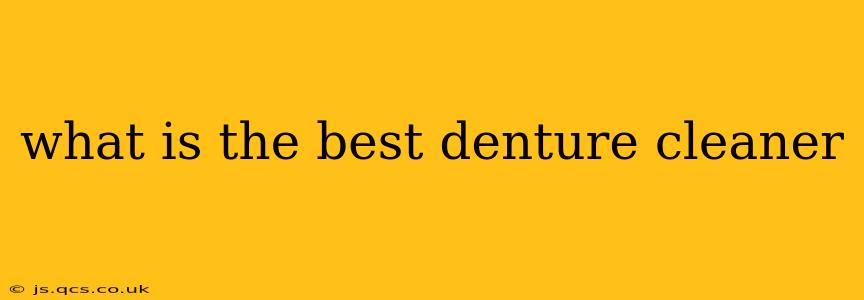What's the Best Denture Cleaner? A Comprehensive Guide
Choosing the best denture cleaner can feel overwhelming with so many options on the market. This isn't just about keeping your dentures clean; it's about preserving their longevity and ensuring your oral health. This guide will explore various denture cleaning methods and help you determine the best approach for your needs.
What are the Different Types of Denture Cleaners?
Several types of denture cleaners cater to different preferences and needs:
-
Soaking Solutions: These are typically effervescent tablets or liquids that you soak your dentures in. They're generally effective at removing food particles and surface stains. Popular brands often contain enzymes to break down protein deposits.
-
Cleaning Pastes/Powders: These abrasive cleaners are excellent for scrubbing away stubborn stains and plaque. However, overuse can potentially scratch the denture surface, so gentle application is crucial.
-
Ultrasonic Cleaners: These devices use sound waves to vibrate and dislodge debris from the dentures. They're very effective but represent a higher initial investment.
-
Brush-and-Water Method: While seemingly simple, a thorough brushing with a soft-bristled brush and lukewarm water can effectively remove loose food particles and surface debris. This is often used in conjunction with other cleaning methods.
What Makes a Denture Cleaner "Best"?
The "best" denture cleaner depends on several factors:
- Effectiveness: How well does it remove stains, plaque, and food particles?
- Gentle on Dentures: Does it scratch or damage the material of your dentures?
- Ease of Use: How convenient is the cleaning process?
- Cost: What is the price per use or overall cost-effectiveness?
- Health Considerations: Does it contain any harsh chemicals that might irritate your gums or cause allergic reactions?
What are the pros and cons of different denture cleaning methods?
Soaking Solutions:
Pros: Convenient, effective for everyday cleaning, often contain enzymes to break down protein. Cons: May not be strong enough for stubborn stains, some individuals may experience sensitivity to certain ingredients.
Cleaning Pastes/Powders:
Pros: Excellent for removing stubborn stains and plaque. Cons: Can scratch dentures if used too vigorously or frequently, abrasive nature may not be suitable for all denture materials.
Ultrasonic Cleaners:
Pros: Very effective at removing debris, gentle on dentures if used correctly. Cons: Higher initial cost, requires an additional device and maintenance.
Brush-and-Water Method:
Pros: Simple, inexpensive, gentle on dentures. Cons: May not be enough to remove stubborn stains, requires diligent brushing.
How Often Should I Clean My Dentures?
Ideally, you should clean your dentures at least once a day, ideally after every meal. This helps prevent the buildup of bacteria and food particles that can lead to bad breath and gum irritation. Regular cleaning also helps maintain the appearance and longevity of your dentures.
What about cleaning solutions that are gentler on dentures?
Many brands now offer denture cleaners specifically formulated to be gentler on the materials. Look for products that are enzyme-based and avoid those with harsh abrasives. Always follow the manufacturer’s instructions carefully.
Are there any home remedies for cleaning dentures?
While commercial cleaners are designed for effectiveness and safety, some individuals use baking soda and water pastes for cleaning. However, use this sparingly as prolonged use can be abrasive. Consult your dentist before using home remedies.
This guide provides a comprehensive overview of denture cleaning. The best approach is to consult with your dentist for personalized recommendations based on your specific denture material and oral health needs. They can offer valuable insights and advice to ensure proper denture care and hygiene. Remember, proper denture care is crucial for maintaining your oral health and the longevity of your dentures.
